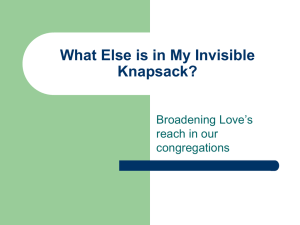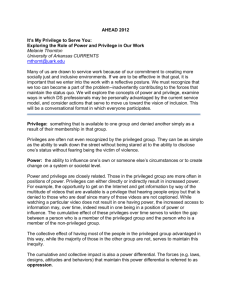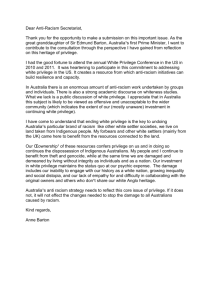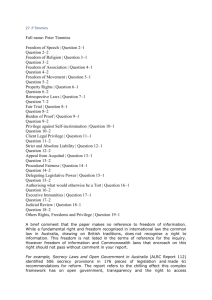Sociology 535: Power and Privilege
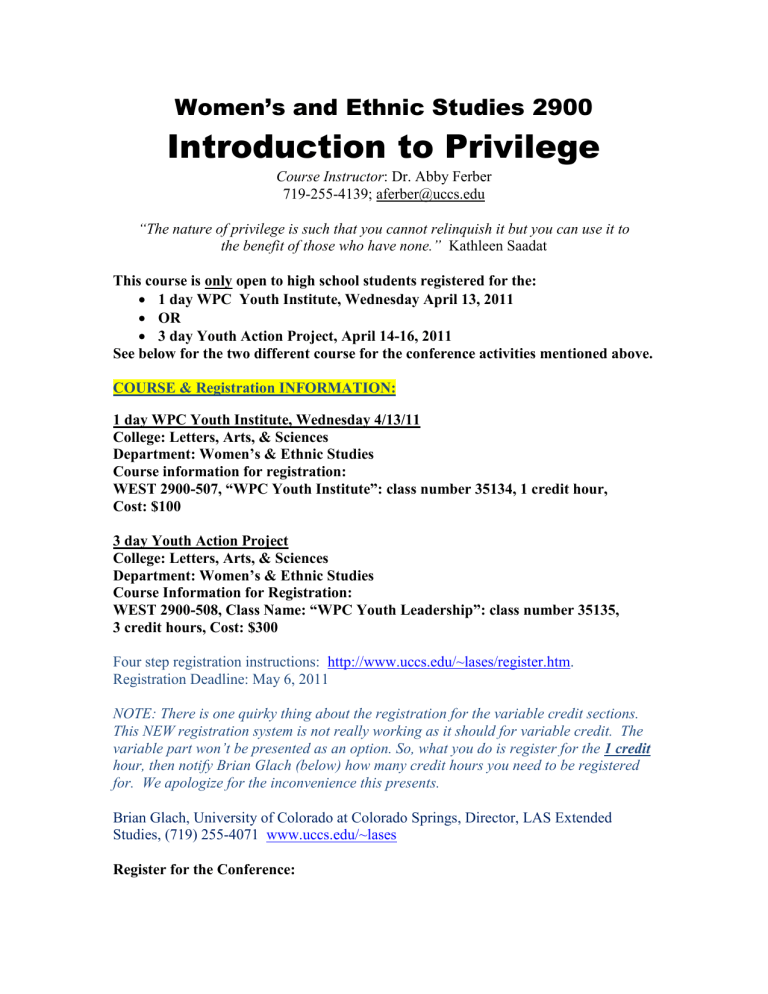
Women’s and Ethnic Studies 2900
Introduction to Privilege
Course Instructor : Dr. Abby Ferber
719-255-4139; aferber@uccs.edu
“The nature of privilege is such that you cannot relinquish it but you can use it to the benefit of those who have none.” Kathleen Saadat
This course is only open to high school students registered for the:
1 day WPC Youth Institute, Wednesday April 13, 2011
OR
3 day Youth Action Project, April 14-16, 2011
See below for the two different course for the conference activities mentioned above.
COURSE & Registration INFORMATION:
1 day WPC Youth Institute, Wednesday 4/13/11
College: Letters, Arts, & Sciences
Department: Women’s & Ethnic Studies
Course information for registration:
WEST 2900-507, “WPC Youth Institute”: class number 35134, 1 credit hour,
Cost: $100
3 day Youth Action Project
College: Letters, Arts, & Sciences
Department: Women’s & Ethnic Studies
Course Information for Registration:
WEST 2900-508, Class Name: “WPC Youth Leadership”: class number 35135,
3 credit hours, Cost: $300
Four step registration instructions: http://www.uccs.edu/~lases/register.htm
.
Registration Deadline: May 6, 2011
NOTE: There is one quirky thing about the registration for the variable credit sections.
This NEW registration system is not really working as it should for variable credit. The variable part won’t be presented as an option. So, what you do is register for the 1 credit hour, then notify Brian Glach (below) how many credit hours you need to be registered for. We apologize for the inconvenience this presents.
Brian Glach, University of Colorado at Colorado Springs, Director, LAS Extended
Studies, (719) 255-4071 www.uccs.edu/~lases
Register for the Conference:
Students must register separately for the WPC Youth Action Project - details at www.whiteprivilegeconference.com
Attending the national, award-winning White Privilege Conference is a unique opportunity to hear from some of the leading scholars and activists in this field. This course is designed to allow you to fully participate in the conference, and reflect upon the new knowledge you learn there, while gaining valuable academic college course credit from the University of Colorado at Colorado Springs (which may be transferred to other colleges and Universities). The WPC YAP provides three full days of specially designed youth workshops, performances, caucuses, and affinity groups. Youth Workshops use interactive activities, film, spoken word,
Theatre of the Oppressed techniques, and small and large group discussions to address issues of heritage, identity, language, isms, labels, power & privilege, teamwork, and strategies for community action. The third day, youth participate in the broader conference and select workshops to attend. Attendance and full participation in the White Privilege Conference YAP is required.
Required Readings:
Students are encouraged to complete as much of this reading before the conference as possible!
1. Privilege, Power and Difference , Allan G. Johnson, second edition
2.
Understanding White Privilege , Frances Kendall, Routledge, 2006.
Course Requirements:
1.
Session Log/Journal : (40% of class grade)
2.
Personal reflection paper . (25% of class grade)
3.
Research Paper . (35% of class grade)
May 20, 2011: All documents must be submitted via E-mail to: aferber@uccs.edu
Special note: Computer problems, internet access, and difficulty with attachments are
NOT considered valid excuses for missing the deadline.
Ethical Conduct: The responsibility for ethical conduct, academic honesty and integrity rests with each individual member of the UCCS community. The Student Codes and
Academic Policies (which may be found at: http://www.uccs.edu/~dos/studentconduct/index.html
) are followed in this class. In general, academic dishonesty includes, but is not limited to, cheating on assignments or examinations, plagiarism (which means misrepresenting as your own any work done by another), misuse of academic materials, or interfering with another student’s work.
Violations of the honor code may result in dismissal from the program.
Session Log/Journal:
Workshop attendees must engage in active participation in the conference.
Attendees must complete and submit a formal session log that lists the title of the presenter, the title of the session(s), and the time length of each session. Additionally, a brief journal entry/description (approx. two-three paragraphs) discussing one major concept presented at the session. What was the most important take-home message for you? Make sure you take notes at the conference to use for your journals.
The Personal Privilege Paper:
This paper should be 5-7 pages. In this paper, explore your own life from the perspective of privilege. For example, you might examine any of the following issues: how has privilege, in any/all forms, shaped your life? (consider race, class, gender, sexuality, disability, etc.) Have you been aware of privilege in your life as you were growing up? Why or why not? As you learn more about privilege, and examine your life, what do you find most interesting or surprising? How has privilege shaped your life opportunities, life chances, experiences, etc. Will your new understanding of privilege change your life, your actions, your behaviors in the future in any way? How do privilege and oppression interact in your life? Are there certain forms of privilege that have been more visible to you than others? This paper is your opportunity to relate what you are learning at the conference and in your readings, to your own life, your previous coursework, and to your independent research for the final paper.
Guidelines for Research Paper:
Begin working on your paper immediately. Choose an issue related directly to privilege that interests you. Think about a specific issue tied to race, gender, sexuality and/or class dynamics, and analyze the issue by bringing privilege into focus. How does focusing on privilege change our understanding of the issue? Has research in the field examined the dynamics of privilege? Your bibliography should include both academic books and journal articles, and sources that are as recent and up to date as possible. Limit use of websites. You should have at least five references in your bibliography.
The central purpose of this paper is to make a cogent case for a particular point of view: this is your thesis. There may be no single correct answer to the issue you address.
There are, however, better and worse answers. This is a function of how well you articulate and defend your position. You must, at every step, provide reasons for your position and for your particular interpretation, occasionally backing up your arguments with quotes. The following suggestions should help you produce a thoughtful and wellwritten paper.
1. Begin every paper with an introduction that includes your thesis and a careful exposition of the key points you will make.
2. Make sure you support your points and arguments with sources, and you may also incorporate examples from your internship experience where relevant.
3. Provide a conclusion summarizing your arguments.
4. Provide page references or footnotes for quotes, and a bibliography with a complete list of sources. Your paper should include quotes from your sources, but you should not rely too heavily upon quotes.
5. Follow either MLA or APA format guidelines, and be consistent.
6. Go through as many drafts as necessary: no one writes a perfect paper on the first try.
Be sure to carefully proofread your paper!
7. Plagiarism will result in an automatic F. Read the plagiarism policy on the UCCS LAS website, and the student academic honor code and make sure you understand what plagiarism is. This is your responsibility!
Guidelines for Journals:
You should complete one journal entry for each session/lecture you attend at the
WPC, and tie the session in to the readings you have completed. Each entry should be approximately one-two pages long, typed, double-spaced. Your journal is your opportunity to relate what you are learning at the conference in to your readings, to your own life, your previous coursework, and to your independent research for the final paper.
The journal is your opportunity to discuss how the conference and the readings are meaningful for you. Make sure you take notes at the conference to use for your journals.
You should use your entries to analyze issues raised at the conference and try to tie the experiences into issues you have learned about in classes, or are reading about in your research, etc.
Questions to think about while writing your journals: Do I enjoy this conference?
Why or why not? Which concepts resonate most for me? Why? Which concepts are most difficult for me to grasp? How does the experience make me feel? Do I sometimes feel uncomfortable? Do the sessions reinforce the issues raised in my readings? Am I learning about issues which reflect my own experiences or the experiences of my friends or family in any way? Do they make me think about my experiences in a new light? How do the various session tie in together or build upon each other? Has the session raised issues I have never thought about before, or make me think about it in a new way? If I have not thought about these things before, why is that? Is this experience raising issues I want to learn more about? Is this experience making me think about myself in new ways?
The Personal Privilege Paper:
This paper should be 7-8 pages . In this paper, explore your own life from the perspective of privilege. For example, you might examine any of the following issues: how has privilege, in any/all forms, shaped your life? (consider race, class, gender, sexuality, disability, etc.) Have you been aware of privilege in your life as you were growing up? Why or why not? As you learn more about privilege, and examine your life, what do you find most interesting or surprising? How has privilege shaped your life opportunities, life chances, experiences, etc. Will your new understanding of privilege change your life, your actions, your behaviors in the future in any way? How do privilege and oppression interact in your life? Are there certain forms of privilege that have been more visible to you than others?



